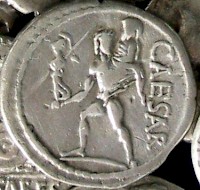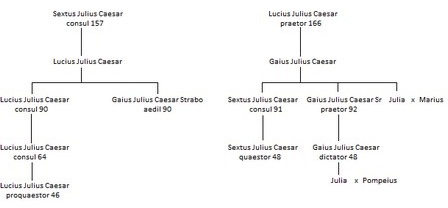Gaius Julius Caesar Strabo
Gaius Julius Caesar Strabo (c.130-87): Roman politician and author.

The end of the second century BCE witnessed the rise of new families in Roman politics. The reforms proposed by Tiberius and Gaius Sempronius Gracchus, and the supremacy of general Gaius Marius, had deeply shaken the political world. One of the new families was that of the Julii Caesares. They were not completely new, but their power rapidly increased, which is also indicated by their claim that they descended from the goddess Venus. One of these men was Gaius Julius Caesar Strabo, sometimes called Vopiscus. His elder brother Lucius Julius Caesar and his distant relative Sextus Julius Caesar were among Rome's foremost politicians.
The first stage of Strabo's career was his membership of a committee that was to supervise the implementation of the Lex frumentaria, an agrarian bill, proposed in 103 by the tribune Lucius Appuleius Saturninus. We know that Strabo became priest (pontifex) in 99 and quaestor in 96. The aedileship was occupied in 90. This was a normal career according to the principles of the cursus honorum.

These were difficult times. In 91, when Strabo's relative Sextus Julius Caesar was consul, a tribune named Marcus Livius Drusus had proposed several reform bills, and had asked support from the Italian allies of Rome. However, he was unable to give them the Roman citizenship he had promised, and was murdered. Immediately, the allies revolted: the beginning of the Social War, which started with many Roman reverses. Consul Sextus Julius Caesar, for example, was defeated and died during a siege.
In 90, when Gaius Julius Caesar Strabo was aedile, his brother was consul. Lucius Julius Caesar proposed the Lex Julia, which offered citizenship to all communities that were not in revolt. One year later, the Lex Plautia Papiria extended the offer to rebels that were looking for a compromise. Gradually, the Romans were overcoming their enemies, although they had made large concessions.
In these days, king Mithridates of Pontus attacked Roman possessions in Asia Minor, which resulted in the First Mithridatic War. First, general Sulla was sent to the east, but he was recalled and replaced by his rival Marius. Now, Sulla marched on Rome - the first commander to do so - and restored order. Marius went into exile. In this chaotic situation, Gaius Julius Caesar Strabo made a bid for the consulship, although he should officially have stood for the praetorship first. Sulla seems to have supported him, but this unconstitutional move created great unrest.
Sulla now left Rome for the Mithridatic War. In 87, Marius returned and joined forces with Cinna, a former consul who had been expelled from Rome too. They captured the city, and many people were massacred. Gaius Julius Caesar Strabo and his brother Lucius were killed during the fighting in the streets. According to the historian Livy,note their heads were exposed on the speakers' platform.
Gaius Julius Caesar Strabo was a well-known man of letters. He wrote at least three tragedies with Greek themes, the Adrastus, Tecmesa, and Teutras. Two fragments survive; the authorship of a third one is contested. As an orator, Strabo was known for his wit and humor. A generation later, the Roman author Cicero published a dialogue called De oratore, in which he made Strabo explain why humor was important in a good speech.
Gaius Julius Caesar Strabo was a distant relative of the Gaius Julius Caesar who was father of the famous Julius Caesar. As a young man, the future dictator listened to the speeches of Strabo, and he is said to have followed his example in his own speeches.